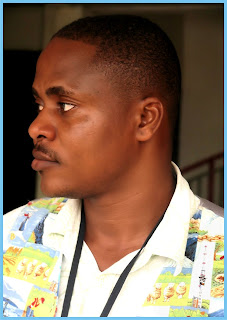Gays “Recruiting” for MSM study?

By Mac-Darling Cobbinah
Research can be defined as any systematic investigation, conducted with an open mind, to establish novel facts, solve new or existing problems, prove new ideas, or develop new theories . More plainly, research is the search for knowledge.
One will ask why defining research is necessary in this piece of writing. The response is simple: because research is used to improve the lives of societies, communities, and marginalized populations. It helps government determine what to do for the people at any particular time. But more importantly, research can be manipulated and sometimes even flat out wrong.
The Ghana Men's Study, carried out by the Centre for Diseases Control (CDC Ghana), was conducted using a Protocol for Integrated Biological Behavioral Surveillance Surveys with Population Size Estimation using Respondent Driven Sampling among Men who have Sex with Men (MSM) in Ghana. The study was reviewed and will be approved as Category IV. This research involved the Ghana AIDS Commission (GAC), RIPS- University of Ghana, West African Project to Combat AIDS and STI (WAPCAS), Noguchi Memorial Institute for Medical Research (NMIMR) and the University of California, San Francisco. University of California, San Francisco was the U.S. institution receiving funding for this research.
Despite the number of stakeholders engaged in this research, the involvement of local organizations already working with MSM, the target population, was minimal. The research team hired (MSM) people, who told them that all MSMs admire “straight looking” men, and so they will be coming in great numbers to participate in the study with the researchers. However, the MSM recruited were effeminate men, who are known, and feared by MSMs in most communities in Ghana, because associating with effeminate guys exposes your sexuality to others. MSM, as we all know, are a highly-stigmatized population; not supported, or even tolerated, by most communities in Ghana. Being labeled as an MSM opens the doors to harassment, blackmailing, and even beatings from people in the community. Therefore, straight-acting gay men will not want to date or even be associated with effeminate guys, because effeminate men visiting their homes creates a lot of suspicion and rumors, sometimes even harassment.
I believe the disregard for advice from the organizations working for the respect of human rights for all people in Ghana, including sexual minorities like MSM, negatively affected the participation of MSM living in communities selected for the research project.
Furthermore, I believe that some people who participated in the study were not MSM at all, but were referred by their friends due to the monetary incentive given to participants of the study. This situation created the impression that young men were lured by gay men, however, the gay community did not lure young men to be part of the study, but rather the organizers of the study lured the participants with their money.
The fact is, men who were supposedly lured by gay men should have reported those incidents to the police or an elder in their community.
Following this study, the Director General of the Ghana AIDS Commission issued the statement, “It is important that all hands are on deck to reduce the number of young people who are lured into MSM”. The GAC then called on all religious leaders, traditional authorities, educators, parents, and NGOs working with young people, to get involved in educating young males on the dangers of being involved in sex with other men.
These actions brought on tremendous backlash to the gay community in Ghana. The religious leaders responded favorably to this call and spent months attacking gay people in their churches and mosques, while others embarked on massive demonstrations to warn gays of their preparedness to attack them if “they” decide to meet anywhere.
In a meeting at the commission, a colleague was used as an example of “a man who lures other men” by one of the technical staff of the commission. This statement felt like the speaker wanted to send a message to him and his friends in the MSM community.
What do we say about these homophobes whose only agenda is to bring their Christian lifestyle (without spirituality) to the community? These people are promoting hate instead of love.
Just recently, at the regional workshop on HIV prevention among MSM in Johannesburg, South Africa, the representative of CDC Ghana passed the same comments during his presentation.
This correction to The Ghana Men's Study must be made now to enable effective collaboration between the MSM community and the GAC. The utterances from its members and homophobes are destroying the image of the gay community. At the end of it all, it is the staff and the homophobes who are benefitting, as MSM are only “used” as research objects.
We urge all MSM who are allowing themselves to be used in a similar capacity as The Ghana Men's Study, to note that their image as gay men is more important than enjoying a few Ghanaian Cedis (money) today, while simultaneously demonizing your community, friends, and family.
Time will tell what is true!
mcobbinah@aol.com


Thomas Muyunga
ReplyDelete8:47 AM (20 hours ago)
to Jim, rectalmicro
A sample domain involving communities that have always been ostracized or not commonly involved in social-demographic studies should be done in such a way as to involve as many of these communities as possible. There are typologies that are discernible even as we deal with men, sexual minorities, MSM, WSW, TG, PLHIV, disabled... These typologies are as a result of these realities: position in society, occupation, location, tribe, status, religion, resilience, integration in communities and skills. Descriptive narratives such these which throw light on say, MSM should also be developed from the typologies/realities and that way it is possible to get the required numbers to make an un-indisputable sample size and results. This applies to MSM anywhere. I only have 3 problems. One is with the use of the term 'recruiting' as used in this sense, "interventions" targeting MSM which only are given importance during a research or survey and the lack of interventions in form of capacity building, responsible citizens' life skills, technical and business education skilling, encouraging social meetings ( not only beer/beverage parties that are common in this population) and understanding the nature of vulnerability that non-conforming persons face in their daily lives. The legal, social services providers and peers are key informants when gauging needs and populations of this kind. We need to use these opportunities to dove-tail into surveys or research exercises ( they are important, no doubt), but so isolated from realities faced by sexual minorities.